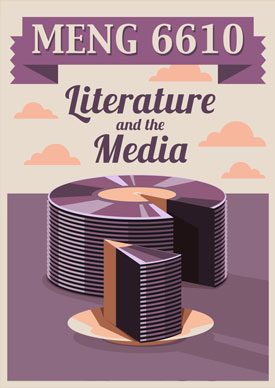This reading schedule (as well as the playful section titles) is meant to be
suggestive, not prescriptive, chronological, or inclusive.
Take a plunge when you sign up for your reports/seminar facilitation, and please clarify the
focus of your presentation with me in advance. I will then also direct you (after you
have done your own search) to additional specific sources, if necessary.
All essay materials listed below are available
on ereserve, online, or easily retrievable from the WSU's Stewart
Library data bases
| Week 1–3 |
General Introduction — Literature and the Modern Media Ecology
The Pencil of Nature — Writings by Hand and Writing with the Sun
-
Historical shapshots of photography I,
II
- Nathaniel Hawthorne, The House of the Seven Gables (chap. I - XIII)
- Jennifer Green-Lewis, "Fiction's Photographers and Their Works: Villains Outside the Frame," Framing the Victorians, 65-94
- Nathaniel Hawthorne, Seven Gables (chap. XIV-XXI)
- "Daguerreotypy and Other Technologies," Norton, 293-313
- Alan Trachtenberg, "Seeing and Believing: Hawthorne's Reflections on the Daguerreotype in The House of the Seven
Gables," Norton 418-438
- Seven Gables ________________________________________ (presentation)
*** Please note: no class Labor Day, 7 September (Week 3) ***
|
| Week 4–5 |
Gender and Information Processing I — Telegraphy, Class, and Female Power
- Henry James, In the Cage
- John Carlos Rowe, "Gender, Sexuality and Work in In the Cage," in Norton, 483-502
- Hayles, N. Katherine, "The Dream of Information. Escape and Constraint . . . ,"
My Mother was a Computer. Chicago: The U of Chicago P, 62-71.
- In the Cage (I) __________________________________________________
- In the Cage (II) __________________________________________________
|
| Week 5–7 |
Sound and Silence — Early Interactions between Literature Print and Phonography (or, Gender again)
|
| Week 7–8 |
Machined Writing (I) — From Manuscript to Typescript
|
| Week 9–10 |
Vampires and Information Culture — Dracula
- Bram Stoker, Dracula (1897)
- Geoffrey Winthrop-Young, "Undead Networks: Information Processing and Media Boundary Conflicts in Dracula,"
Literature and Science, Ed. Donald Bruce and Anthony Purdy. Amsterdam/Atlanta: Rodopi, 1994. 107-129
- Jennifer Wicke,
"Vampiric Typewriting: Dracula and its Media," ELH 59 (1992): 467-93
- Dracula (I) ____________________________________________________
- Dracula (II) ____________________________________________________
|
| Week 11–12 |
American Literary Naturalism and the Modern Media Ecology
Frank Norris's McTeague (I) — Cinema, The Body, and the Big Stink
- Frank Norris, McTeague
- Paul Young,
"Telling Descriptions, Frank Norris's Kinetoscopic Naturalism and the Future of the Novel, 1899,"
Modernism/modernity 14.4 (2007): 645-668
- (Sergei Eisenstein, "Dickens, Griffith, and the Film Today," Film Form: Essays in Film Theory, ed. Jay Leyda esp. pp. 195-234)
- McTeague ________________________________________
Frank Norris's McTeague (II) -- Agency and Angst: Mangled Hands and Machined Writing
- Frank Norris, McTeague (ctd.)
- Michael Fried, "Stephen Crane's Upturned Faces," Realism, Writing, Disfiguration—On Thomas Eakins and Stephen Crane. Chicago: U of Chicago Press, 1987: pp. 93-121.
- McTeague ________________________________________________
|
| Week13 |
Machined Writing (II) — Identity, Gender, Power)
- J. M. Barrie, The Twelve-Pound Look
- Dorothy West, "The Typewriter"
- D. H. Lawrence, selected essays from Phoenix II
|
| Week 14–15 |
The Poetics and Politics of (European) Media Modernism
- Italian Futurism, Futurist Manifestos,
F-Technopoetics & Beyond
- Guillaume Apollinaire, "The New Spirit and the Poets," Selected Writings of Guillaume Apollinaire. Ed. and trans. Roger Shattuck. New York: New Directions, 1971: 227-237
- Guillaume Apollinaire, "Lettre-Ocean"
- Italian Futurism ________________________________________
- Modernist Media Poetics _________________________________
*** Essay hard copy due date: Mo, 30 Nov 2009 ***
Please consult the Editing Checklist in the Toolbox for essential pointers regarding your essay.
|
| Week 15 |
Artificial Summary & Conclusion
|
